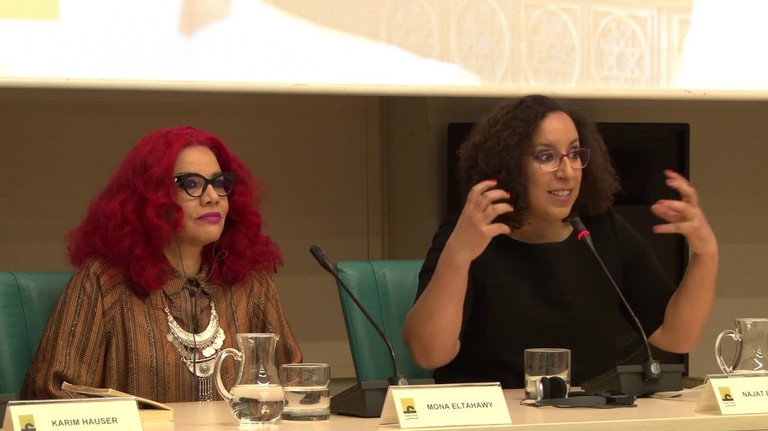Mujeres


Ciclo "Diálogos sobre sociedades abiertas". 6. Feminismos, religión y laicidad (ENG/ESP)
Publicado el 31 de marzo 2020
TODOS LOS VÍDEOS DE ESTA CATEGORÍA
-
"The Role of Women in Twenty-first Century Egypt", by Nawal Moustafa [English/Spanish]
On Thursday, September 19, journalist and entrepreneur Nawal Moustafa offered this conference in Madrid, at which she spoke about the situation of Egyptian women at the present time. Along with Moustafa, an Ashoka social entrepreneur and founder of the "Association for the Children of Imprisoned Women" in Egypt. Taking part in the event was Ana Sáenz de Miera, the Director of Ashoka Spain, and Karim Hauser, who is responsible for Casa Árabe's Governance program. As a result of what we now call the Arab Spring, women's participation in processes of change is a topic which has been debated from many different perspectives. Egypt, like Tunisia, is a country in which the role of women has been instrumental in terms of social mobilization. Given the current turmoil in the region, what is the outlook for Egyptian women's challenges and prospects in the twenty-first century? For more information: http://en.casaarabe.es/news/the-role-of-women-in-twenty-first-century-egyptPublicado el 31 de marzo 2020 -
“Yogurt with Marmalade: Or how my mother became Lebanese” (ARABIC)
2018.26.11. Lebanon’s Lena Mehrej presented her graphic novel, published by Ediciones del Oriente y del Mediterráneo, at the Casa Árabe headquarters in Madrid. She held a dialogue with graphic novelist Quan Zhou, author of Sweet-and-sour Gazpacho. "In Lebanon, yogurt has been eaten with salt and grated cucumber (very finely grated) since the beginning of time. One day, Lena Merhej (Beirut, 1977) was stunned when she saw her mother eat yogurt with marmalade. Years later, she sketched this lovely story about her mother, a German woman from Hannover, and created a portrait of the peaceful co-existence of contradictions” that existed in her family and, perhaps to a lesser extent, her country. A closer look at the Arab world through the eyes of a women from old Europe, proving that the East is not so far and also has a memory, nostalgia and open wounds." Alfonso Zapico, Babelia - El País, April 21, 2018 Lena Merhej (Beirut, 1977), born to a German mother and Lebanese father, completed her studies in Art and Graphic Design. She has given classes in illustration and animation at the Lebanese American University. With more than twenty illustrated albums for children, she formed part of the founding team of Samandal, the first magazine of comics in the Arab world. Her animated film Dessiner la guerre (Drawing War) won the jury’s award at the New York Festival in 2003, and her graphic novels Kamen sine (Another Year) and Yogurt with Marmalade received the award for best comic book at the International Comics Festival of Algiers in 2009 and 2013, respectively. In 2016, she coordinated the monographic issue of Samandal on youth, sexuality and poetry. More info: http://en.casaarabe.es/event/“yogurt-with-marmalade-or-how-my-mother-became-lebanese”Publicado el 31 de marzo 2020 -
(4) Gender and youth: lessons and action
International Forum "A decade of tranformations in the Arab world". 04/24/2017: Arab citizens and their development. "Gender and youth: lessons and action". Hibaaq Osman, El-Karama and Mayssoun Sukarieh, King’s College. Moderated by: Maram Anbar, Club de Madrid. More info: http://en.casaarabe.es/event/a-decade-of-transformations-in-the-arab-worldPublicado el 31 de marzo 2020 -
(4) Género y juventud: lecciones y acciones.
Foro Internacional "Una década de transformaciones en los países árabes". 24/04/2017 Dentro del bloque dedicado a "El ciudadano árabe y su desarrollo", tuvo lugar la conferencia "Género y juventud: lecciones y acciones", por Hibaaq Osman, El-Karama y Mayssoun Sukarieh, King’s College. Moderó: Maram Anbar, Club de Madrid. Más información: http://www.casaarabe.es/eventos-arabes/show/una-decada-de-transformaciones-en-el-mundo-arabePublicado el 31 de marzo 2020 -
(5) Arab women after a decade of transformations
Casa Árabe organized this public conference as part of the International Forum on “A decade of transformations in the Arab world.” With Madawi al-Rasheed, Fatemah Farag and Hibaaq Osman. Over the last decade, we have witnessed a series of transformations in the Arab world, taking place in societies which asked for democracy while clamoring for freedom and dignity. However, Arab women continue to fall victim to discrimination, violence and the violation of their rights. There is evidence of this in the annual reports by the most important world organizations published since the 1980’s, with indicators ranking the Arab countries at the bottom in terms of gender development, measures for the empowerment and gender equality, furthering women’s role in science, women’s activity in the economy and labor market, and women’s participation in political life, as well as other indicators. This conference, which formed part of the international forum “A decade of transformation in the Arab world,” included the participation of three experts who discussed the many challenges ahead to be faced by Arab women, from different perspectives: Madawi al-Rasheed, a visiting professor at the London School of Economics (LSE) Middle East Centre; Fatemah Farag, a journalist and the founder and director of Welad Elbalad Media Services LTD, and Hibaaq Osman, the founder of al-Karama and a member of several organizations which specialize in gender-based and feminist studies. More info: http://en.casaarabe.es/event/arab-women-after-a-decade-of-transformationsPublicado el 31 de marzo 2020

!["The Role of Women in Twenty-first Century Egypt", by Nawal Moustafa [English/Spanish]](/images/videoyoutube/2972048/open-uri20210224-22796-4s0tc4-0-listado?1712907451)



